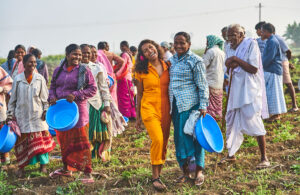
Diaspora Co – Building a Better, Equitable Spice Trade
Creating an equitable spice trade by disrupting an outdated trade system and putting money and power into the hands of Indian farmers.
Germany
Grace Robinson December 3, 2020
Israel native Osnat Michaeli and her co-founders Erez and Guy Galonska were inspired to deliver the freshness and flavor of farm produce to the hearts of cities around the world. Through brothers Erez and Guy, Osnat discovered the magic of the agriculture industry and the thousands of plant varieties existing in rural areas that industrial agriculture models are unable to produce in-house. She discovered that many cities rely on distant farms to ship in their produce, sacrificing freshness and sustainability. Through travel and experimentation, the three began a quest to bring farming and fresh produce to urban communities in order to significantly improve the food’s safety, quality, and environmental footprint.
What resulted from their efforts was their company, Infarm, which pairs vertical farming with IoT technologies and machine learning to offer an alternative food system that is resilient, transparent, and affordable. Seedlings are placed in stacked incubators where they can grow under optimal conditions with 99.5% less space than soil-based agriculture, 95% less water, 90% less transport and zero chemical pesticides. The herbs and vegetables that are grown directly in restaurants and markets allow all city shoppers to find fresh produce that is necessary to live a healthy and sustainable lifestyle.
Mood of Living: Where did you grow up?
Osnat Michaeli: Israel
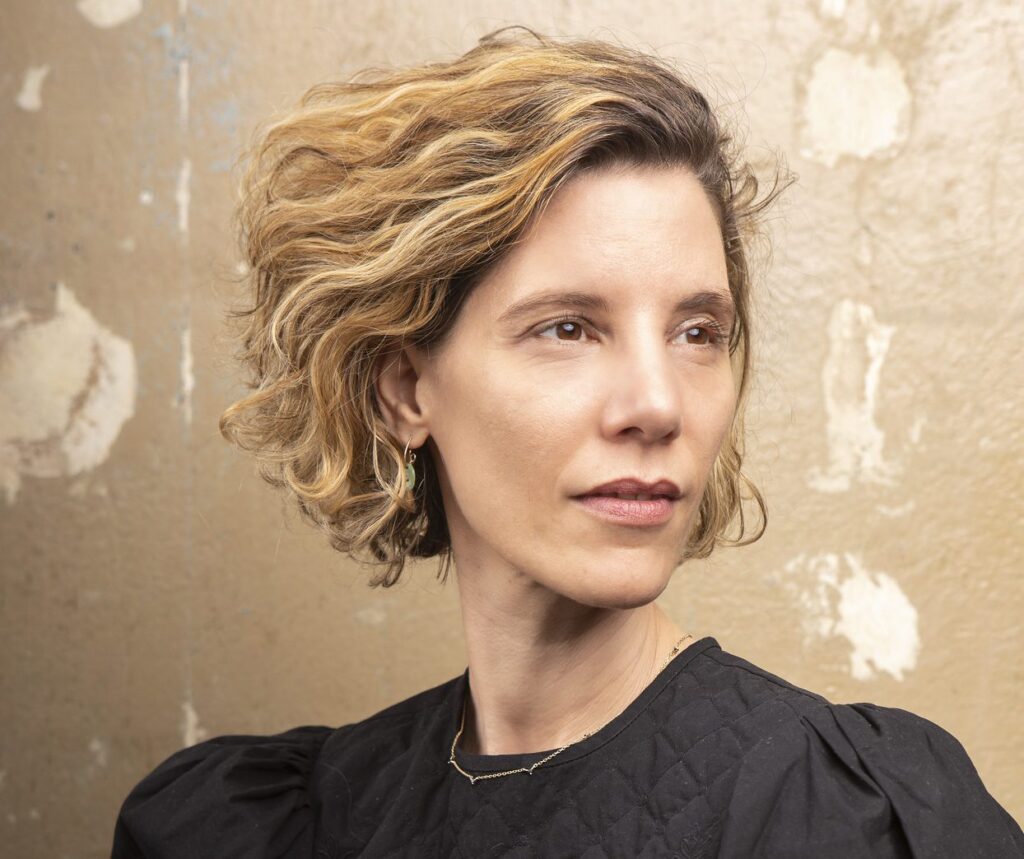
Osnat Michali, Co-Founder and CMO
MoL: Where did you go to school? What did you study?
OM: I studied film at the Camera Obscura School of Arts in Tel Aviv, Israel.
MoL: How did you meet your co-founders? What led you to create this business together?
OM: I met Erez Galonska in Tel Aviv, when we were both working in the film industry. Along with Erez’s brother Guy, we came together around the idea that being close to the land, and particularly its produce, is vital to our health and creativity as a society.
From the beginning, we began to explore – through travel, growing and experimentation – ways to bring natural vitality of the local farm into the city, and the freshness and flavor back into our lives. We also realized that our current food system’s biggest deficiency is that it is too far removed from the people it is trying to feed. In 2013, we converted a 1955 Airstream trailer into our first vertical farm in one of Berlin’s most well-known urban farm spaces, ‘Prinzessinengärten’. This trailer became a hub for our early experimentation, where visitors could harvest herbs and microgreens and we could welcome a vibrant community of urban planners, food activists and others to explore the challenges behind making urban farming a reality. This research station and lab would form the beginnings of what we today call Infarm.
MoL: How were you introduced to the agriculture industry? Have you always been passionate about sustainable food production?
OM: I was introduced to the agriculture industry through Guy and Erez. I came to understand that there are thousands of plant varieties that consumers never get to try, because the industrial agriculture model doesn’t support them. I was inspired by the idea of creating a system that could offer small-scale quality and variety at large-scale proportions.
MoL: Tell us about Infarm’s mission. How is your work helping to improve the safety, quality, and environmental footprint of our food?
OM: Our mission is to grow a smart worldwide Infarm network that brings farming to the people. We want to help cities become self-sufficient in their food production while, as you mention, significantly improving the safety, quality, and environmental footprint of our food. To do that, we are redefining the entire chain from start to finish. Instead of building large-scale farms outside of the city, optimizing on a specific yield, and then distributing the produce, we decided it would be more effective to distribute the farms themselves throughout the city. We’re bringing nutritious produce so fresh it is still living, to consumers right at the point of sale. With our constantly growing and evolving Infarm network, everyone can enjoy all the goodness of own-grown produce (full of nutrients and flavor, free of chemical pesticides, sustainably grown) without having to farm themselves.
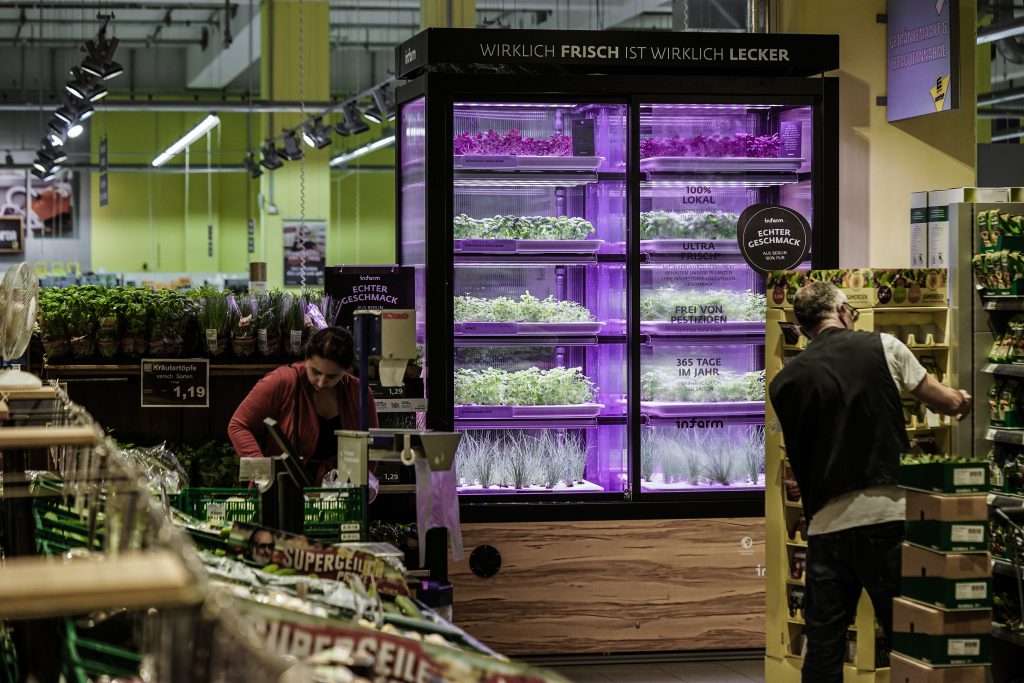
MoL: What sustainable development goals have you implemented into your business model?
OM: We’re continuously working to set a new sustainable standard in farming. Our farms require 99.5% less space than soil-based agriculture, use 95% less water, 90% less transport and zero chemical pesticides. Additionally, we were the first business of our kind to receive Global GAP certification, which measures Good Agricultural Practices with food safety and environmental components.
MoL: How do your modular farms work? What technology is used to grow the produce?
OM: We combine highly efficient vertical farms with IoT technologies and machine learning. Our farms use hydroponic technology, a process that involves growing the plants in water-based, mineral-nutrient solutions, rather than soil. The farms themselves are controlled remotely using sensors and a centralized, cloud-based platform that can be accessed from our Berlin headquarters. Using this platform, we’re able to gather up-to-the-minute information about how our plants are growing and how they respond to different growth environments on a minute scale.
MoL: What are the benefits of placing modular farms in local, urban communities rather than using off-site warehouses?
OM: By partnering with retailers and placing our farms directly in communities, we’re essentially eliminating the supply chain of food. We minimize energy usage by minimizing the need for distribution—when produce is grown at the point of sale, there’s no need to transport crops across the country, or overseas. This approach also allows us to to offer customers the highest quality produce, and without the challenges of distribution, we’re able to offer a wider variety of crops to consumers.
MoL: What is a cloud-based farming system? What are the benefits of using this system?
OM: Our cloud-based system uses sensors to track how our plants are growing in our farms across the world. From our Berlin headquarters, we are able to collect to-the-minute data from our cloud platform about how our plants are growing and how they respond to different environments. Our system also uses this information to continuously adjust and improve itself, so each plant grows better than the one before, and we’re able to provide our plants with the best combination of light spectrums, temperature, pH, and nutrients for optimal growth. With more than 1,000 farms in stores and distribution centers, we’re able to use the data on each one of more than 500,000+ plants we grow every month to understand their unique growth patterns and offer the highest quality product to consumers.
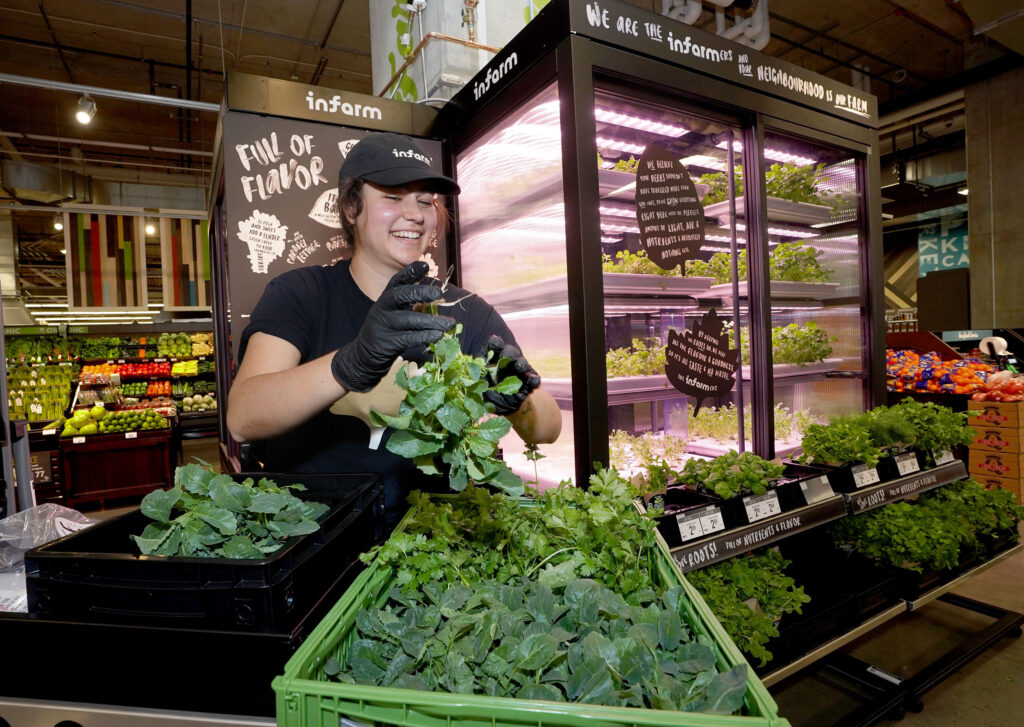
MoL: What cities are you currently helping become self-sufficient in food production? Which cities do you hope to expand to?
OM: In the United States, we have a partnership with Kroger’s QFC stores; our farms are in 15 locations across the state of Washington. And we plan to expand to additional retailers and cities in the future. We also have hundreds of farms in cities across Germany, France, Switzerland, the UK, the Netherlands, Canada, Denmark, Luxembourg, and soon, Japan.
MoL: What advice can you give to those who wish to create a sustainable business?
OM: When my co-founders and I started Infarm, our ideas seemed almost esoteric to most people. At the time not many people were talking or thinking about food security, and the climate crisis wasn’t the topic that it is today. We were looked at as idealistic and others thought we didn’t have the expertise needed to invent a new agricultural solution. Finding support was challenging, and we went through a lot of trial and error ourselves.
One of my biggest pieces of advice is to find people you trust to join you in your journey. It’s important to find the right partners who inspire you, partners whom you trust and you enjoy working with. My co-founders and I elevate one another. We each have a different area of focus and expertise; mine is on branding, while my other two partners focus on operations and technology. We create more together than anything we could possibly produce apart. This is also true for the investors, mentors and employees you bring along.
Also, know that you can be your own expert when you have passion. If we had realized how much we had to master when we started, not only about vertical farming, but about a whole range of topics, it would have been quite scary. But we found out that you can be your own expert when you have the passion for what you’re doing. You have to love it and keep learning new things because the need to be open to learning and exploring just accelerates over the years as you grow.
MoL: How have you seen the agriculture industry change since creating your company in 2013? How do you anticipate it changing in the next ten years?
OM: When we started Infarm, people weren’t as concerned about the climate crisis and its potential impact on food security. Now, people are starting to understand how important it is to establish agriculture solutions with minimal environmental impact. And more recently, the COVID-19 pandemic has showcased the shortcomings of our global food supply chain. Consumers’ access to fresh, healthy produce is at the mercy of retailers’ supply and demand challenges, particularly in urban environments where local agricultural farms aren’t possible. With COVID-19 shuttering restaurants and schools, large-scale farms that depend on these buyers have an issue of demand not meeting supply. And on a smaller scale, local farms are struggling, as farmer’s markets are being shut down in cities around the world.
In the years ahead, it will only become more imperative that we establish a new system for providing food that is sustainable for generations to come. We’ll need to establish more resilient local food economies with shorter supply chains, so they are leaner, more accountable, safer and more sustainable, and we also need to increase cities’ self-sufficiency by diversifying local food production.
MoL: What challenges have you faced in creating Infarm? What are your challenges during this current pandemic? What have you learned from these challenges?
OM: Early on, finding supporters was somewhat difficult. Sustainability and food security were not the hot topics they are today, and we had to show people that we knew what we were doing. As people saw our solution for themselves and became more educated on the incredible burden traditional agriculture places on our planet, they became increasingly interested in investing in our business. Later on, the challenge became more about finding the best business model for commercial application and the right partners to scale with. Each new challenge you face will present new opportunities to learn and grow, and it’s important to evolve from each so that you’re more equipped to tackle the next. If you enjoy what you’re doing, even the tough times can be fun.
MoL: Do you live a sustainable lifestyle outside of your company? How so?
OM: In many ways, Infarm reflects the continuing search in our own lives for fresher, healthier more sustainable food. Not only can we now grow fresh produce locally in a way that is more sustainable for our family and our community, but as we partner with more retailers around the world, we have a way of offering more people, especially those living in cities, the option to experience fresher, more sustainable and more vibrant food than ever before. The spirit that led us to found Infarm and the ways we search for sustainability in our own lives are one and the same.
Photography courtesy of Infarm

Creating an equitable spice trade by disrupting an outdated trade system and putting money and power into the hands of Indian farmers.
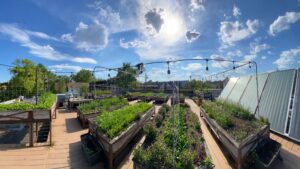
Founded by Helen and Mike Cameron, Uncommon Ground is America’s first certified organic rooftop farm.
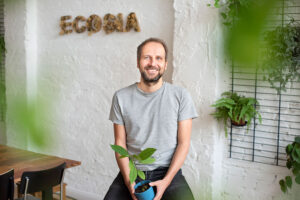
Ecosia, founded by Christian Kroll, is a sustainable search engine that turns searches into trees and is notably the first-ever German B-Corp.